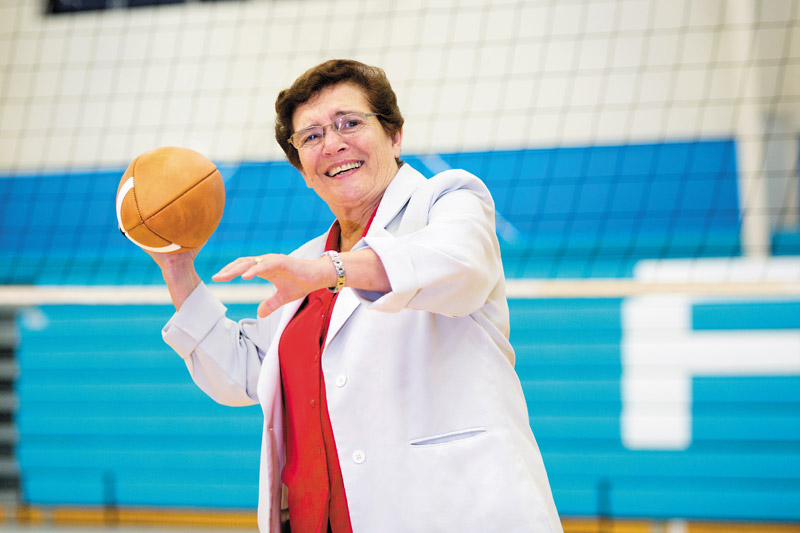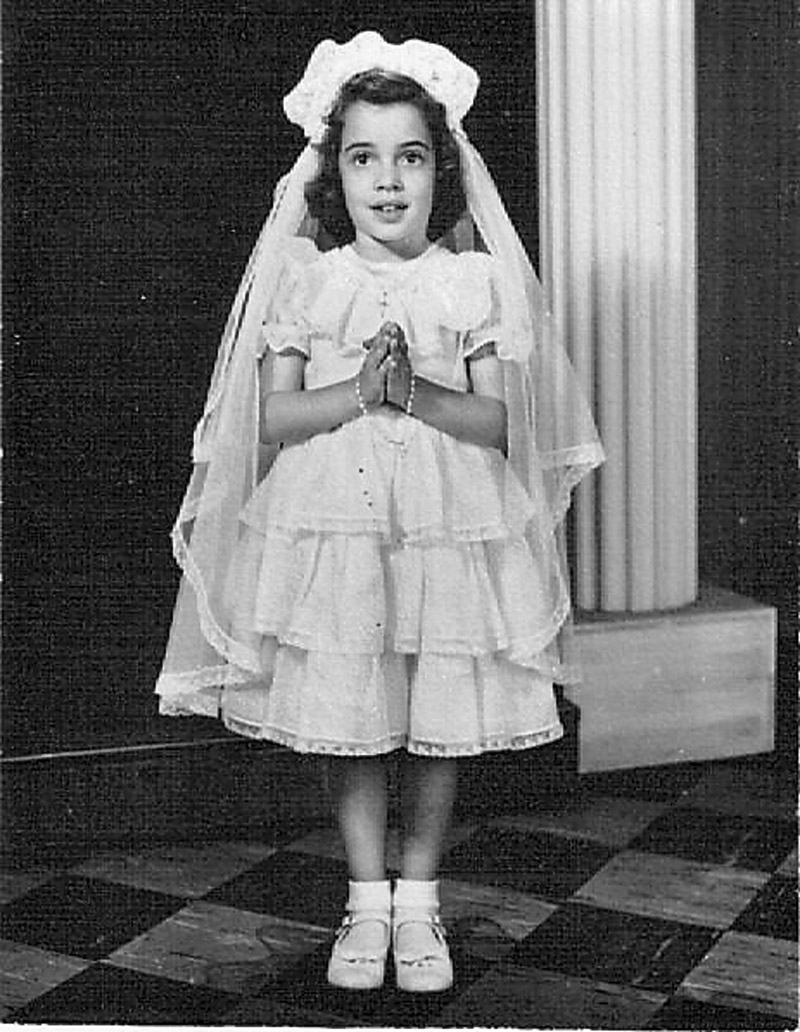The Big Champion of St. Francis

Sister Joan of Arc Souza is joined by a few of St. Francis School’s student-athletes: (from left) Nani Santo, Wembley Maileli, Misiona Ribeiro, Zach Alcos and Malia Gurrero.
How does a person make a difference in the world? Just ask Sister Joan of Arc Souza. She’s the diminutive Catholic nun with a big name. And yes, she’s named after that Joan of Arc, the courageous teenager who led French troops into battle for her king and her God and was burned at the stake by the British.
At her core, she’s Rochelle Souza, the kolohe local girl who grew up in Pauoa, has a cat named Princess, and loves Hawaiian food, especially poi. Her high school friends still call her Rocky.
But to hundreds of students at St. Francis School — the one-time girls-only institution located in the heart of Mānoa Valley — she’s the much-beloved Sister Joan. She’s also their witty and highly dedicated principal and head of school, not to mention one of the difference-makers behind so many noteworthy changes at St. Francis over the years — including the school’s decision to go coed in 2006, thus ending an 82-year-old tradition.
And yet, the students probably have no idea why she chose to name herself after that particular saint.

Souza breathed life into St. Francis School’s athletic program.
“As a child growing up, I was just fascinated with the story of Joan of Arc,” explains Souza, who also serves as the school’s president and CEO, as well as oversees its educational and business operations. “I was kind of tomboyish. Joan of Arc wore a suit of armor, she rode a horse, and she must’ve been a little bit of a tomboy, maybe.
“I just identified with her and her story. And she led armies into battle to put the rightful king back on the throne. That was pretty fascinating to me, and the fact that she was willing to die for what she believed.”
So when it came time for her to choose her Catholic name, she went with a woman who personified courage, leadership and faith. Like her heroic predecessor, Sister Joan of Arc Souza is a leader, an inspiration and a savior.
At St. Francis, Souza’s journey has come full circle. She graduated from the school in 1962, back when it was called St. Francis Convent School and only admitted girls. For Souza, the desire to enter the church came quite early.
Casino Night: A Benefit For St. Francis
St. Francis School presents its third annual Ninth Island in Manoa Casino Night and Silent Auction Sept. 16, when the school gym turns into a Las Vegas casino for a night of gambling and merrymaking.
Raffle prizes include a trip to Las Vegas, courtesy of Vacations Hawai‘i, and more. Tickets are $75 each and include food, soft drinks, casino chips and a raffle entry.
Schedule of events:
4 p.m. Mass
5 p.m. Dinner
6-10 p.m. Casino opens
(Bingo from 6 to 8 p.m.)The event raises funds for St. Francis School, which is located at 2707 Pamoa Road. For more information, email ninthisland@stfrancis-oahu.org or call 988-4111.
“I would say, probably second or third grade I started talking about it,” she says. “The sisters looked like heroes to me, and I wanted to join them. I wanted to be one of them.”
That may be why she gravitated toward two passions: church and teaching. She even remembers the names of all her favorite teachers. There was Sister Damien Therese at Sacred Hearts Convent School, Souza notes. And when she transferred to St. Francis Convent School, “there was Sister Mary Jean and Sister Rose Annette. They horsed around with us. They played with us. They made school fun.”
Sister Rose Annette, who taught biology, physiology and religion, remembers her former pupil well.
“She was a good student and dedicated to learning,” says Sister Rose Annette, who still lives in the St. Francis convent, about Souza. “She was quiet in her own way — always a hard-working student. She excelled in high school. Whatever she was assigned, she completed.
“I never expected her to be a sister, but I was glad when she entered the convent.”

Even at a young age, “God was the most important part of my life,” says Souza.
PHOTO COURTESY SISTER JOAN OF ARC SOUZA
“That’s what I wanted to do,” Souza confirms. “God was the most important part of my life. I wanted to serve. And I wanted to be a math teacher.”
But she doesn’t remember being such a quiet student. In her elementary days, she often found herself in the principal’s office “getting dressed down for whatever.” And when she got to high school, she admits to being a pretty typical teenager.
“I dated. There were boys. But there was something missing. Something nagging,” she confesses. “Maybe I wanted something better, something other than marriage and family.”
That something was, according to Souza, a summoning from God. She can’t explain it any other way.
“God calls. It’s just that desire. How do two people figure out that ‘you’re my soul mate’? It’s a feeling, it’s a desire, it’s an inclination, and it’s almost unexplainable that this is what you want,” she says.
“This is where I was meant to be.”
At 17, she traveled to the novitiate in Syracuse, New York. It was a huge change for the small-town O‘ahu girl. “The farthest I’d ever been was Kaua‘i,” she notes.
Three other Hawai‘i girls accompanied her to New York that year, but Souza was not quite ready to conform to all the rules within the novitiate.
“So they sat us down and said, ‘You will wear shoes all the time. You will not go barefoot,'” Souza recalls. “And I just said ha, ha. And as soon
as we got into our rooms, off came the shoes and on came the slippers!”
The worst part wasn’t culture shock or being away from family, she adds, but the weather. “Hardest thing was the snow, the ice, the cold. When they would force us to go out for walks and it was 35 degrees — of course, you had mittens and boots and coat — I just hated that. Hated that. Hated the cold. I said, someday I’m leaving here. I’m going home.”
Souza did eventually go home, but first spent time teaching an after-school religion class at a New York public school. That’s when she realized too many of those students had what was, to her, an odd notion of deity.
“They were afraid that God was this ogre with a baseball bat, and if I step out of line, I was going to get it,” she recalls. “That wasn’t the loving God I was teaching. I tried my best to teach them no, that’s not what God is.”
Following two decades in The Big Apple, Souza realized it was time to return to Hawai‘i. Again, she saw the hand of God at work once the sister who’d originally been given the head of school position at St. Francis declined the offer. With her degrees in theology and administration, Souza stepped into the role and turned out to be the perfect fit.
And the timing was right. Her father had been diagnosed with prostate cancer and she wanted to spend time with him.
But that wasn’t the only challenge facing her at home. When Souza agreed to take over the school, she was given an ultimatum: “‘You only have 273 students. Turn it around or we’re going to close it.’ And I thought, ‘You’re not closing my alma mater.'”
Immediately, she began taking a long, hard look at the curriculum. It was outdated. So she made upgrades, bringing in more math and college-placement courses.
She also found that many of the teachers were set in their ways. So she decided that some of them had to go.
And since the school only admitted girls from grade 6 and up at the time, she determined there weren’t enough students to keep St. Francis in business. So she added a preschool — coed, of course.
“The (original) plan was to expand after preschool and add first grade, and then the next year, add a second grade, and so on, to expand gradually,” explains Souza. “2018 would be our first coed graduating class, had we stayed with that plan.”
Instead, the school expanded quite quickly. The year St. Francis School introduced its first-grade class, Souza received a call from a father who said, “‘My son is going to be a sixth-grader. Will you take him? I understand you’re coed now.’ And I said, ‘We’ll take your son as long as he comes with another boy. We can’t have just one boy in the sixth grade.'”
St. Francis has grown rapidly since then. Today, it is a fully coeducational pre-school, elementary and high school. To Souza’s credit, she breathed life into the school’s athletic program, adding boys varsity sports programs such as football, baseball and basketball during her tenure. In addition, the school’s Sister Rose Annette Ahuna Gymnasium and Clarence T.C. Ching Music Center were constructed, and AP classes and an American Sign Language program were launched under her direction.
And maybe more importantly, the school nearly doubled in size in the past quarter of a century, growing from 273 students to more than 500.
So yes, Sister Joan of Arc Souza quite literally saved the school.
Souza acknowledges that things are different now for kids in ways that go far beyond reading, writing and ‘rithmetic. Teaching in 2017 means dealing with a new set of challenges.
“We fill a niche that I don’t think any other school fills,” she explains. “We take students that most of the schools would not — students that are probably on the borderline of failing in life — and we give them a chance to prove themselves. We’ve had our failures, but we’ve had more success than failures.”
The school welcomes children of all faiths, and even no faith, as long as they agree to take religion classes.
“I make no apologies for being Catholic,” states Souza. “Now, I know that most people aren’t Catholic and it’s not my job to take these people and turn them into Catholics. If you’re Mormon and that is the faith of your family, then be a good Mormon. Follow the rules. If you’re Catholic, don’t be dead wood. Whatever church you belong to, love others as you love yourself.”
A modern woman, Souza is unabashedly outspoken when it comes to expressing her views on the church and societal issues.
For example, she says, “I think the church needs to wake up and allow priests to get married. The first pope had two sons. He was a married man.”
Furthermore, she believes women should be allowed to be priests.”I don’t have a problem with that, although the bishop is probably going to say, ‘Oh my god, no.'”
Her progressive spirit extends to gay, lesbian and transgender people as well.
“In my school, I’m sure we have kids who are gay. We have, probably, kids who are or will some day be transgender,” Souza says. “The church shouldn’t make it harder for them. God loves them. We can’t deny them. Who am I to judge?”
When Sister Joan of Arc Souza walks the campus, her kids know her.
“Hi, Sister Joan,” they sing out whenever they see her roaming the campus grounds.
When she enters a kindergarten class, the teacher declares, “Oh, it’s Sister Joan!” and the kids flock around her for a hug.
Souza sees each and every one of them as her own. Their families are her life, her ‘ohana. She understands where they’re coming from.
“Our students’ parents are blue-collar workers, and they’re working extra to pay the tuition so their children can get white-collar jobs,” Souza explains. “They’re still making those sacrifices. That’s the clientele we work with. A few come from money, but the majority of our students, they’re on tuition assistance.”
This is Souza’s 27th year at the helm of the Catholic school. Remarkably, that’s the longest anyone has served as a head of school in Hawai‘i. And at 73, she has no plans to retire.
The spirit of Joan of Arc, Souza claims, keeps her committed.
“She stayed loyal to what she believed in,” notes Souza of her namesake. “I think that was the most awesome thing: giving her life for what she believed in.”
And Souza’s faith is what propels her onward.
“Faith is not knowing. If you know, you don’t need faith,” she says. “Faith means I can’t prove it, I don’t know for sure, but I believe.”
So how does a person make a difference in the world? In Souza’s case, she’s doing it by staying true to herself and faithful in her mission.
Or as she puts it, “I’m creating young people who will be citizens of their church, and citizens of the global community that they have to live in.”
And Sister Joan of Arc Souza is there to help guide them along the way.






